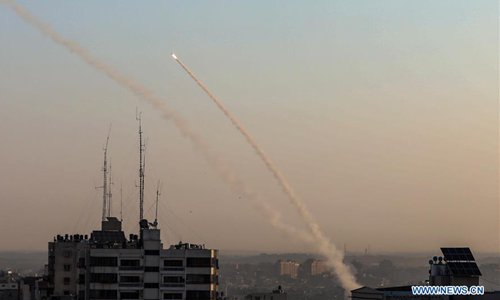HOME >> WORLD
Palestinians in Gaza fear tension with Israel slides into war
Source:Xinhua Published: 2019/11/14 7:48:47

Militants in the Gaza Strip fire rockets to Israeli cities on Nov. 12, 2019, following its killing of a senior Islamic Jihad commander. Baha Abu al-Atta, a senior militant and leader of al-Quds Brigades, the armed wing of the Palestinian Islamic Jihad in the Gaza Strip, and his wife were killed earlier Tuesday in an Israeli aerial attack on their house in eastern Gaza city. (Photo by Yasser Qudih/Xinhua)
The fear of war raised among the nearly 2 million Gaza Strip population as the newest wave of tension with Israel has been going on, leaving at least 23 killed and dozens wounded.
The new wave of violent tension broke out on Tuesday after Israel killed senior Islamic Jihad militant Baha Abu al-Atta and his wife in an airstrike on his house in eastern Gaza.
Gaza health ministry said in a statement that death toll since early Tuesday morning has climbed to 23.
Militants kept firing barrages of rockets and projectiles into Israel in spite of Arab and international mediation and contacts between Israel and Gaza militants to contain the situation and reach calm.
The Israeli media reported that since Tuesday, militants in the Gaza Strip had fired more than 220 rockets and projectiles into Israel.
An Israeli army spokesman said in a press statement that the Israeli army targeted spots, sites, posts and facilities that are used for launching rockets from the Gaza Strip into Israel, adding that blacksmiths and carpentries used for manufacturing rockets have also targeted and destroyed.
Gray and black smoke continued rising and could be seen clearly from different places in the Gaza Strip, while explosions and buzz of drones in the sky of Gaza are clearly heard all the time.
This atmosphere of tension has created a feeling of fear among the population that this wave of tension between Israel and Gaza militant groups may trundle within the coming hours to a war.
Halima Abdulla, 45, from Gaza, said "last night was a horrible night, especially when we were hearing the explosions and the bombs either from the fired rockets or from the airstrikes," adding "this has left my children in panic."
"My children were unable to sleep and they were running from one room to another in the house and sometimes they were hiding under their beds," she added, explaining that "even in our homes, we don't feel safe."
Shayma'a al-Mughrabi, another 25-year-old woman from Gaza, said that "we have spent a long night full of fear because we were afraid that the Israelis would target nearby buildings in our neighborhood."
"I'm afraid that this wave of tension will go on for too long and then it rolls into a large-scale offensive similar to the war in the summer of 2014," she said.
Military tensions often raise serious concerns among civilians in Gaza, especially as they do not know where things will go.
The Gaza Strip has witnessed about 15 rounds of tension with Israel since the summer of 2014.
Schools and universities in the Gaza Strip have been disrupted, and streets in the Gaza Strip seemed almost empty of pedestrians and cars, except for ambulances and civil defense, while shops and public institutions were closed.
A Palestinian source said that Egypt and the UN have moved to curb tension and prevent it from sliding into a broad confrontation similar to the 2014 war in which more than 2,000 Palestinians were killed.
The source told Xinhua that Egyptian officials and UN envoy to the Middle East Nickolay Mladenov are holding bilateral contacts with the parties concerned to return to the cease-fire understandings that had been reached in Gaza last year.
Gaza political analyst Hani Habib linked the current tension in Gaza to the internal political crisis in Israel.
"Israeli Prime Minister Benjamin Netanyahu's most important goal in this wave of escalation in Gaza is to drag his rival Benny Gantz into a unity government headed by Netanyahu himself," Habib said in an article published in the local newspaper Al-Ayyam.
Posted in: MID-EAST